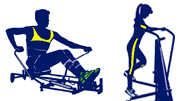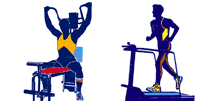|
POP PINS, POP PIN ASSEMBLIES AND SPRING PLUNGERS
In the fitness industry pop pins, which go by several names including, pop pin assemblies, retractable spring plungers and retractable spring loaded plungers are widely used on strength equipment for various purposes. Some common functions are to set and lock in seat height, range of motion (ROM) settings, back pad adjustments and roller pad comfort settings.
The pop pin assemblies consist of a plunger, a compression
spring, a threaded locking cap and a knob. Although pop pin assemblies appear
to be a minor part of a piece of single station strength unit or a home gym,
they really fill important roles. If they are not functioning at all, a seat
may have to be used at the lowest setting, making a position like a pec deck
unusable for all but the tallest users or if the pop pin is used to set a
range of motion on a position like a leg extension, it could force the user
to have an incomplete exercise or to have to over extend just to start the
exercise.
More serious failures are when they slip out of the
setting during use, while under a load. This type of failure could easily
cause a serious injury to the user.
Several thing can go wrong with these retractable spring
loaded plungers. A common problem is that the pull knobs, which could be
round knobs, T-knobs or draw knob style, can come off and get lost. Although
this problem is easily resolved by replacing the missing knob, in the meantime,
the ROM adjustment or seat adjustment can't be used. Another common failure
is that the internal compression springs break or lose their strength. This
is a serious failure because the tip of the plunger may not stay engaged
throughout the complete exercise routine. Once again, this type of failure
can cause serious injury to the user. Occasionally, the plunger it self breaks,
but more often, the functional tip of the plunger will wear and when that
happens, the pop pin won't stay in place when under a load.
Frequently, what is reported as a failure of a pop
pin is actually wear of the receptacle holes on the range of motion cam or
the seat support or some similar device, that the tip of the pop pin plunger
locks into. With wear, the holes in the range of motion cam or seat support
tube, get elongated or oversized, which causes the pop pin assembly to slip
out of place at times, depending upon which settings were chosen.
Routine preventive maintenance of strength equipment
should include an examination and lubrication of the pop pin assemblies to
ensure that the are safe and that they continue to function as designed.
|

 |





